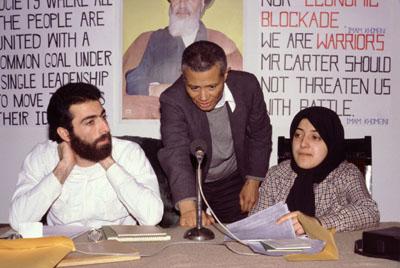Scene Again
Feb. 13, 1980, was Day 102 of the hostage crisis in Tehran, Iran. But for globetrotting freelance journalist William Worthy ’42, it was just another day in just another post-revolution country.

In this photograph by Randy Goodman, William Worthy (center) sets up a question-answer session at a Tehran hotel with Hossein Sheikholislam (left) and Massoumeh Ebtekar (right), spokespeople for the students who held 52 U.S. diplomats hostage for 444 days.
Ebtekar, often interviewed by U.S. journalists during the crisis, was dubbed “Screaming Mary” by the media. Now a professor of immunology in Tehran, she talked to Matt Lauer of the Today Show last September about the status of women in her country. Sheikholislam, meanwhile, became Iran’s deputy foreign minister and ambassador to Syria.
As a journalist, Worthy was drawn to societies that had revolted against oppressive, U.S.-backed regimes. At the same time, he believed the U.S. media’s foreign coverage favored American interests. “You have to talk about the imperialist press when you talk about the mass media,” he told an MIT audience in 1973.
Perhaps because of this, Worthy had the U.S. government frequently nipping at his heels. In a well-publicized incident in the 1950s, he couldn’t get his passport renewed after traveling to off-limits China. To a Senate subcommittee investigating the affair in 1957, Worthy said, “I want my passport. And I want it now.”
Worthy, self-described as a pacifist and civil libertarian with a “rebel temperament,” never tired of the hassle nor wavered from a belief in the value of his work in a democratic society. For that, he recently received the Louis M. Lyons Award for Conscience and Integrity in Journalism from Harvard’s Nieman Foundation for Journalism.
Photographer Randy Goodman traveled with Worthy and recalls that “he just never rested. Sometimes I’d just want to get something to eat,” she laughs.
Worthy did eat — often while working. One night in Iran, he interviewed Hossein Sheikholislam over dinner, seeking insights into both the crisis and Iran’s Islamic Revolution. As Worthy later reported in The Boston Phoenix: “Martyrdom is a concept very dear…. If one is killed in the struggle, one’s ideas live on, and one’s work is picked up and carried to fruition by others.”